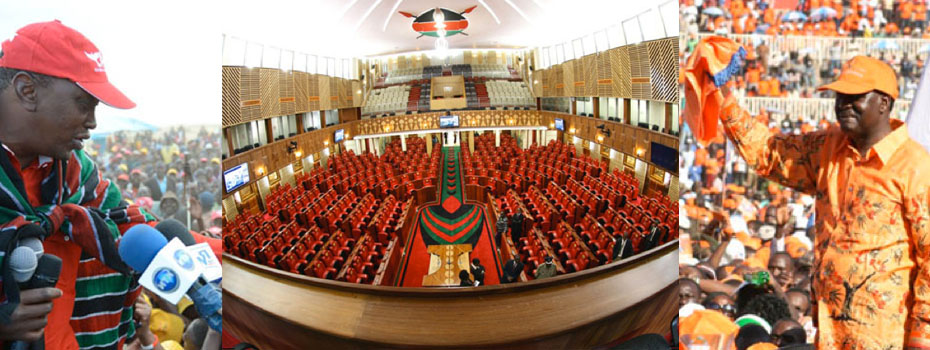When you realize what 14.3 million registered voters in Kenya should vote for on Monday, March 4th 2013, it feels like being in a country with old democratic traditions and not in Kenya, which achieved its independency only a little more than 50 years ago. On the same day there were held local elections together with the presidential elections. The voters were asked to fill out six different colored ballots and put them into the relevant ballot box. So please be patient about the results. This will take its time.
Among other things this election is also about representatives for women affairs from each county, which amounts to a small socio-political revolution. Beside this the political system in general is to be decentralized in Kenya. The 47 counties should be able to decide much more directly in their local parliaments, where also new governors will be elected. And more than that there is another election for a new senate, which should give each of the regions more power in Nairobi. So its really a D-Day in Kenya! Pretty much to elect for just a single day, even for countries with much more experience in elections.
In view of the riots after the last presidential elections in 2007 the government wanted to provide now maximum transparency by the use of an independent election commission called IEBC, to avoid impressions of electoral manipulations in any kind. To prevent multiple casted votes there also were computer systems in use which sent the already casted votes directly to the IEBC. Whether this worked properly like it was planned from the technical side or not is still to be seen, considering the relatively unstable internet in Kenya.
In Kenya voters traditionally make their cross for the candidate of their own tribe from which the riots in 2007 resulted. The then electoral result was so close, because many voters of the tribe of the Kikuyu – which is the biggest tribe in the country and therefore could provide the presidents so far – has been disappointed of President Kibaki and also voted for the opponent of the tribe of the Luo, Raila Odinga. At that time President Kibaki suddenly and unexpectedly caught up to Odinga when the votes were counted and finally won the extremely tight election. The Luo tribe felt cheated for their first electoral victory. The rest is known well.
Also this time the political opponents were trying to stir up the atmosphere among the tribes during their political campaign instead of being a good example for the public trying to be a candidate for all Kenyans, not only for the members of the own tribe. But unfortunately there has been reports weeks before the election day about gangs initiating riots in slums and other districts for cash paid by staff members of the political rivals. Gang members even were urged to kill certain individuals or even the complete family of those. A normal riot would be paid with about 100 Kenyan Shillings, murder is about 500 KES, less than 5 Euro, and a whole family would bring a lot more.
Money always plays a big role when there are elections in Kenya. Thousands are coming to the political rallies knowing to go home with some 100 KES notes if they were lucky, though everyone knows that such kind of buying votes is illegal. But poverty is everywhere in Kenya and so people take the opportunity to make some extra shillings. The politicians want their vote so its fair enough to let them pay for queuing in the sun for hours until they can make their cross on the ballot. If they will vote for the one who paid is pretty questionable anyway because there are so many rallies and opportunities for some extra cash to make.
Nevertheless, the young growing middle class in Kenya is hoping so much for a peaceful election and that – no matter who wins the election – the promises which has been made during the campaigns will finally be kept. Young Kenyans are sick and tired of money and land grabbing politicians who put their followers in well paid positions where they can grab more money. What Kenya urgently needs is investments in schools and universities, in hospitals and in all kind of infrastructure. They hope for a significant boost to tourism which is beside the export of tee and flowers the most important part of kenyan economy.
They deeply hope that their Kenya will not be shown again in the worlds media as a country of uncivilized band of murderers who are not able to accept electoral results. When you read the comments in kenyan online media it shows, that this is their main concern. Here, people of all tribes are pleading, praying and hoping for peaceful elections.

